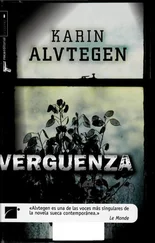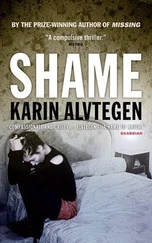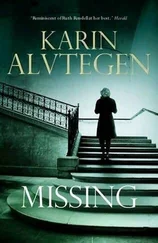Jan-Erik had sat there silent, incapable of matching his wild hopes with what was actually happening.
His mother got up from the table and glared at her husband.
‘You’re an idiot and you know it,’ she said.
Then she refilled her wine glass and went upstairs. Annika followed right behind her. Alone, father and son finished dinner in indignant silence.
Several days passed, and for the first time he had dared take up the fight. In his seventeenth year he had finally opened hostilities. At first timidly, but after daring a few times he had begun to enjoy being able to slam doors, stomp up the stairs and in wrath say whatever he liked. He remembered Annika, the way she had sometimes slunk along the walls. He had no memory of his mother’s actions during the war. Only the eternal dressing gown, which she wore more and more often. And Gerda’s nervous comments – ‘He only wants what’s best for you’ and ‘Is it really worth all this?’ And then the resolution, which on his father’s part was a concession. Of course he could go to America if he wanted to, Axel had even arranged everything for him with the help of his contacts. American Field Service had a student exchange programme with the objective of promoting understanding, contact and friendly relations between students from Europe and the United States. It was a context in which a Ragnerfeldt belonged, and the tickets were already booked.
At that moment Jan-Erik had realised for the first time how much he hated his father, and staying in the house had seemed impossible. A month later he had left, his own plans defeated and travelling on his father’s tickets. He ended up in a little dump of a town in the Midwest, living with a conservative middle-class family with Christian values. The Vietnam War was raging, and the family stood wholeheartedly behind their president. He himself had not been very involved. But around Christmas in 1972, being Swedish was enough to land him in the opposition camp. The prime minister Olof Palme had criticised the United States and compared the continuous bombing of North Vietnam to Hitler’s attacks during the Second World War. In a rage President Nixon had refused to receive the new Swedish ambassador. Jan-Erik had done his best to be accepted anyway. He had devotedly assimilated American culture and set a new personal record for adaptation.
He jumped when his phone rang. The sudden sound in the empty house frightened him. It was Louise’s number; she was ringing from the shop. He hesitated, wanting to let it ring and have the voicemail pick it up, but he knew that wasn’t a good solution. He had used that trick too many times before.
‘Jan-Erik.’
‘It’s me.’ He didn’t want anything from her so he said nothing.
‘Where are you?’
‘At the house. I’m looking for a photo of Gerda Persson.’
‘How’d it go with your father?’
‘Same as usual. No improvement, at any rate.’
‘When are you coming home?’
She sounded different from that morning. He could almost imagine that they were having a normal conversation in which one could say anything that came into one’s mind rather than having to screen things out.
‘I have to look for that photo. I don’t know how long it will take, I just got here.’
‘Are you coming home after that?’
‘Yes.’
There was a pause.
‘You know, I just want to say that I’m glad we had that talk this morning, even though it was hard. I think something good can come out of it.’
He said nothing.
‘Anyway, I just wanted to tell you that. I’ll see you later then.’
‘Sure. Bye.’
He hung up. Her new tone worried him; it had sounded almost like a rapprochement.
He got up and put the photo of Annika back on the shelf, adjusting the angle so it could be properly seen. It struck him that it had been a long time since he’d been to her grave, but he had never really felt any connection with the place. How could he? Her name on the headstone proved that she was lying there, but he had never seen her with his own eyes. His father had refused to pay for the trip home, since Jan-Erik had refused to use the return ticket he had already financed. Against his parents’ will he had stayed in the States after finishing his studies, and for two years he had hitchhiked around with no goal except to avoid going home. It had taken him ten months to make enough money for a plane ticket, and in the meantime he’d missed both Annika’s funeral and the Nobel ceremony for his father. But he did make it home in time to see Björn Borg win at Wimbledon. They had met twice as junior players. One time Jan-Erik had been close to beating him.
It had begun to grow dark outside when he opened the door to his father’s office. His hand found the new light switch. He stopped in the doorway. About a month after his father had his stroke, when Jan-Erik had become used to the idea that no one was going to stop him, he had gone in and sat down behind the desk. He had sat there for a long time, absorbing the feeling. Then he had carefully pulled out the top desk drawer, just to see how it felt, and then pushed it back in.
One wall was filled with bookshelves, most of them holding Axel’s books translated into various languages. The opposite wall was covered with certificates and framed photographs, and here and there was a space where a signed picture had once been. He went over to the wall. None of the photos was of the family. They were all from some award ceremony or banquet with dignitaries. Believing that he would find Gerda anywhere was hopeless.
He went over to the cupboard door. He had only looked inside once before, and he’d found the key in the desk drawer. The darkness and raw cold struck him, and he realised that he needed a pocket torch. There was one on the shelf inside the door to the cellar; it had always been there. Removing it would have been ill-advised, since his mother had always been meticulous about everything having its place, and her reaction was unpredictable. Yes, the pocket torch was right where it should be, despite the fact that no one would ever be angry again, as if it had learned to obey all on its own. Nothing happened when he pushed the button on it. He went to the kitchen and pulled out the fourth drawer from the top – the drawer for batteries, elastic bands and clingfilm. There was an unopened packet. It occurred to him how strange it was to find charged batteries in the deserted house. As if they were the only things still alive. They lay there, ready, waiting for something that no one knew would ever happen. He changed the batteries and went back to the library.
There was a half-full rubbish bag inside the door. He shone the torch beam into it and saw printed materials and other papers. He would take those with him when he left – if his father had intended to throw them away they were undoubtedly rubbish. Axel had saved everything. Jan-Erik’s mother had called his hoarding a disease.
The cupboard was bigger than the others in the house, and ran along one whole side of the room. Heaps of paper, magazines, folders, binders, fan letters, newspaper clippings and boxes. All in a godforsaken mess that could not have been systematic even for the person who had once stuffed it all in. It would take weeks to clean out, sorting through what should be saved. The rubbish bag was a sign that his father had already begun, but considering the small amount in the bag and the quantity left he hadn’t got very far. The dream was to find an unpublished manuscript somewhere in the mess. After his Nobel Prize, his father had only published a few books; they were well received by the critics, but there was no real enthusiasm for them. It was clear to everyone that Shadow had been the high point of his career, a level he never managed to achieve again. But an unknown manuscript published after his death would bring in a considerable sum, even if it was from his declining years.
Читать дальше












